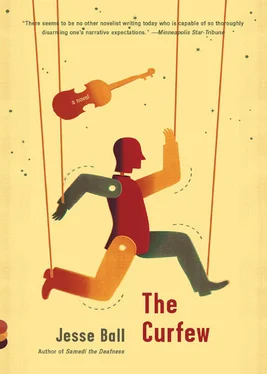2. You will decide whether there is magic or not, and if there is magic, if anyone knows that there is or not, and if anyone knows about it, whether they tell anyone or not.
3. You will decide how many of the puppets will die, and how, so that we can have it happen at the right spots in the show.
4. You will decide if you want the puppet show to be funny or not. The puppet show will always be sad, but it can also be funny in parts.
5. You will decide if the theme should be: marriage, sickness, enchantment, inheritance, or revenge.
6. You will come up with the name of the villain. All the other names come out of the villain’s name. The villain’s nature, even that comes out of the villain’s name. The only thing that doesn’t come out of the villain’s name is the expression on the face of the puppet which will be our hero or heroine. That we will paint last, when we know everything. It is likely to be a thin smile. That’s my specialty, but we shall see.
7. The puppet show will be in three acts. We will talk about the puppet show forwards, and when we are done talking, we will write the puppet show backwards. Believe me, it is a good method.
8. We will think about extra tactics, like stalling when the puppet show is about to begin, so we can paint the features of audience members onto minor puppet characters as a nice surprise.

Mrs. Gibbons came into the room carrying a tray with a pot of tea and a pile of hot biscuits with butter and honey.
Mr. Gibbons gave his wife an annoyed look.
— We have a great deal to do here, and can’t be bothered with this.
But Molly was already eating the biscuits. Mrs. Gibbons poured the tea into cups and left the room, shutting the door quietly.
Mr. Gibbons set out a variety of puppets for Molly to inspect, all the while humming to himself in a happy way. It was his belief that puppetry was as expressive as ordinary theater, and in fact perhaps more expressive. If one person can control every aspect of the performance, then nothing need be lost. Nothing! He looked up suddenly.
Molly was peering at him across an empty basket where the biscuits had been. An empty teacup was there, an empty pot of honey, and a little plate half full of butter.
She took a napkin from the chair next to her and wiped her hands very deliberately.
*Shall we start?
Mr. Gibbons nodded.
THE DOOR OPENED BEFORE WILLIAM AND WHO DO YOU SUPPOSE WAS THERE?
A young woman, in a nightgown. The straps were falling down, but it did not seem to concern her. And from farther in, a voice came.
— Who is it?
— It’s a man, maybe thirty, thirty-five? Thin. In an old coat, hasn’t shaved. Widow’s peak.
— That’s Drysdale.
— Is that him, really?
— Yeah, tell him to come in.
— Tell him yourself.
The young woman turned and walked away from the door. Gerard came down from the floor above. He appeared relieved. One could tell this because he removed a handkerchief from his right pocket, folded it, and returned it again.
— William, he said. You came.
— Did you think I wouldn’t?
— Well, you know. At first we thought you and Molly were taken along with Louisa, but then someone said they saw you at the park in the lake district. That’s where you live?
— That’s where we live.
— Well, come in. Come in.
In the next room, perhaps twenty people were sitting around, drinking what looked like wine out of wineglasses. They were the sort of people William & Louisa used to be in the habit of knowing, a crowd of elegant furniture, like the legs of a herd of gazelle taken together, and equally useless, when all things are considered.
— Is that wine? asked William.
— We have our small pleasures, and we have gotten away with it so far. A glass?
— I haven’t had wine in so long. I, well, yes, thank you.
William accepted the glass. The man closest to him turned and stuck out his hand.
— James Goldman. You’re William Drysdale, I heard Gerard say so a moment ago.
— That’s right.
— A pity about the music. I was a violinist, too, actually, amateur, nothing like you, but I, well, I was a musician, too, and I suppose it’s the same isn’t it, for us both, not playing?
— I try not to think of it.
William’s expression was pained.
— Of course, the man continued, it’s not the same. I don’t mean it that way, I guess, I, I just mean, it’s hard to not play, damned hard.
— It is that, said William. It is that.
THE WAILING OF A SIREN, THEN
between the houses and along the streets. It brought a harsh electricity into William’s stiffness. Was no one else worried?
He leaned towards the man next to him.
— Do you often go out past the curfew?
The man laughed.
— Of course not. I actually have never done it.
Another man, very young, was refilling people’s glasses with a newly uncorked bottle of wine. He had a very thin moustache and wispy hair.
— We stay the night, always, always. There are positively rooms full of beds, wouldn’t you know.
He went off through the room, extending his bottle and giggling.
— Out after curfew indeed. You’d be a madman!
— That’s Salien, he’s a tremendous talent in vaudeville. In secret, of course. But really …
The man touched William’s sleeve.
— … I hope you’re not intending to try to make it home. They’ve been doubling and redoubling. Far too dangerous. Go home in the morning. You’re not a fool.
The woman next to James Goldman spoke up.
— Did you see the fire on the way?
There was a peculiar mood in the room — an enforced jollity. Everything must be tinged with a disdainful humor and accompanied by slight laughter. William disliked the whole thing.
— A fire? said a bald man standing by the window. Did you set it?
— Me, don’t be ridiculous, Sean.
— Well, you’re introducing the subject. There must be a reason for it.
— They’re always fighting, James explained.
— I saw the fire, said William. I think the building burned to the ground.
— A victory, said the woman in a low voice.
— Shush, Clara. Don’t talk like that, not even here.
Gerard came in.
— Come with me. I have something I want to show you.
James was whispering something to Clara. No one seemed to be paying any attention. William got up.
— All right, then.
At the back of the house, there was a door to an addition. This addition was only the length of a room and unheated. Gerard handed William a coat from a pile. He himself put on a coat. They sat on stools.
— Is everyone here involved? asked William.
— Involved?
Gerard laughed.
— The point is: information like that doesn’t exist. Who is, who isn’t involved: it doesn’t matter. We simply spread the method , and people act on their own. They don’t need to tell anyone.
— The method?
— The method. It’s very simple. Everyone will soon have learned of it, through channels exactly like this. Just one person telling someone else, someone trusted.
— Is it that bad?
— If you’re caught with it in writing, less than a page of text, you’re shot. Interrogated, shot. Most people who get interrogated say the same thing, and it’s true.
— What’s that?
— They found a piece of paper. They don’t know anything about it. But in this town, there hasn’t been too much printing yet. That’s the dangerous part, the printing. But it spreads by word, also.
— What is it?
William had been struggling with himself. He wanted to leave, to go home and forget about the whole thing. He could feel it, like a door opening out of sight. This was something he didn’t want to know, or be a part of. But he was curious, yes he was, and he was lonely, too, and here he was sitting with Gerard, a man he had known many years, and they were talking. Also, he was wearing a coat that wasn’t his, a leather coat such as he would never ordinarily wear. There were things in the pockets, but he did not look to see what they were.
Читать дальше













